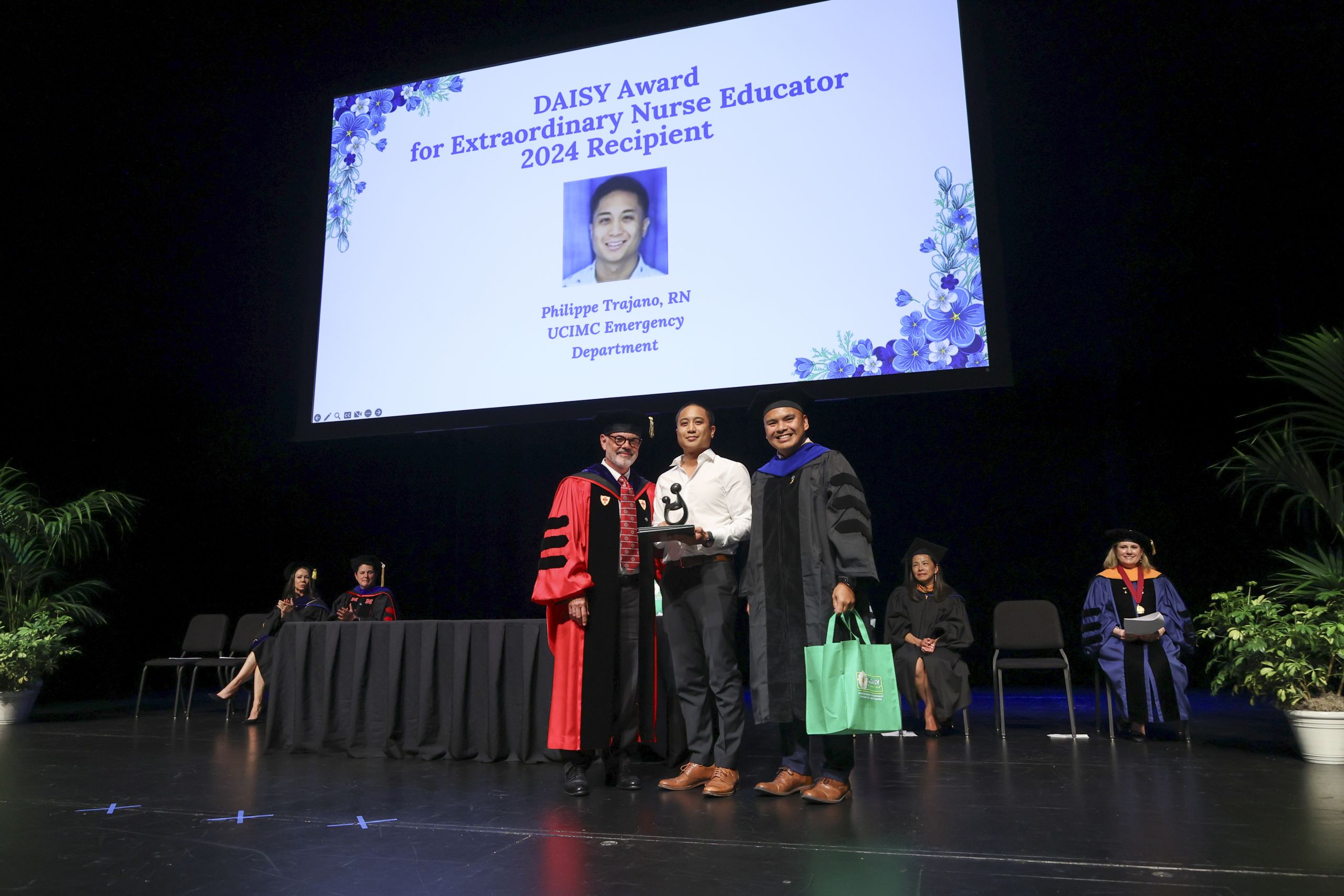 From studies on how technology can help pediatric cancer patients manage pain to an intervention for caregivers of loved ones with dementia, scientists and educators at the UCI Sue & Bill Gross School of Nursing are leading the way forward to a better, healthier and more equitable future.
From studies on how technology can help pediatric cancer patients manage pain to an intervention for caregivers of loved ones with dementia, scientists and educators at the UCI Sue & Bill Gross School of Nursing are leading the way forward to a better, healthier and more equitable future.
In fiscal year 2020-21, which ended June 30, nursing investigators received 13 new awards totaling $3,922,138 million in grants and contracts.
The National Institute on Aging was the single largest source of funding, accounting for $763,220 for Associate Professor Jung-Ah Lee’s study of a home-based, culturally and language specific intervention for dementia family caregivers.
UCI received a total of $592 million, the most funding in campus history.
School of Nursing ongoing and new studies that received funding in FY2021 include:
Research grants
- Organizing nursing to improve care quality and safety: a hybrid implementation-effectiveness study, Principal investigator: Miriam Bender, Sponsor: Agency for Healthcare Research and Quality, Award: $374,292: A study to evaluate the effect of the clinical nurse leader (CNL)-integrated care delivery on national quality and safety outcomes and identify characteristics of CNL implementation needed to achieve outcomes.
- Innovative pain and symptom management program for children with cancer, Principal investigator: Michelle Fortier, Sponsor: National Cancer Institute, Awards, a diversity supplement to original $3 million grant: $572,677 and $67,161: A study to develop PainBuddy, an app that helps pediatric cancer patients manage pain and stress, and delivers data to their providers for intervention if necessary.
- Mindfulness-based intervention to Address Post-Traumatic Stress Disorder (PTSD) in Trauma-exposed, Homeless Women, Principal investigator: Dana Rose Garfin, Sponsor: National Institute on Minority Health and Health Disparities, Award: $127,036: A project that examines the effect of a mindfulness-based intervention on formerly homeless women who have experienced trauma as a result of their experience.
- RAPID: Compounding crises: Facing hurricane season in the era of COVID-19, Principal investigator: E. Alison Holman, Sponsor: National Institute of Nursing Research, Award: $63,424: This study examined Florida and Texas residents’ response to repeated hurricane exposure amid the pandemic.
- A home-based, culturally and language specific intervention for dementia family caregivers: stress reduction and education with wearable technology for health, Principal investigator: Jung-Ah Lee, Sponsor: National Institute on Aging, Award: $763,220: A study to help caregivers of a loved one with dementia manage stress and improve their relationship with their loved one.
- Come As You Are – Assessing the Efficacy of a Nurse Case Management Human Immunodeficiency Virus (HIV) Prevention and Care Intervention among Homeless Youth, Principal investigator: Adey Nyamathi, Sponsor: University of Texas Health Science Center at Houston, Awards: $16,322; $21,823; $595: A study to compare the effectiveness of an HIV prevention and care intervention to address the high prevalence of HIV among youth experiencing homelessness.
- Cognitive-Behavioral Compassion Training (CBCT) to provide Sessions to Treat and Reduce Elevated Stress among Students (C-STRESS), Principal investigator: Melissa Pinto, Sponsor: National Institutes of Health/National Institute of Mental Health (NIH/NIMH), Award: $33,287: A study to develop a mind-training intervention to build attention, mindfulness and compassion among college students to address increasing rates of psychological distress.
- FW-HTF-P: D-CCC: Digital Health for Future of Community-Centered Care, Principal investigator: Amir M. Rahmani, Sponsor: National Science Foundation, Award: $149,932: A planning grant to learn more about community needs and analyze how to efficiently implement a digital community-centered care model that is organized and affordable.
- Implementation and Effectiveness of Centers for Disease Control (CDC) Guidelines for Green Card Applicants with Latent Tuberculosis Infection, Principal investigator: Sanghyuk Shin, Sponsor: National Heart, Lung and Blood Institute, Award: $37,529: A study to evaluate the reach of new CDC guidelines for screening and treatment of latent tuberculosis among green card applicants and how faithfully the guidelines were followed.
- Improved understanding of tuberculosis (TB) transmission by accounting for within-host heterogeneity of M. tuberculosis: A population-based molecular epidemiology study in a high HIV prevalent setting, Principal investigator: Sanghyuk Shin, Sponsor: National Institute of Allergy and Infectious Diseases, Award: $636,595: A study of two new methods to identify the diversity of multiple strains of tuberculosis complex (Mtbc) in the same individual; accounting for this could improve detection of the disease and host-related factors that affect transmission.
Training grants
- Office of Statewide Health Planning and Development (OSHPD) Bachelor of Science (BS) in Nursing Science Capitation, Principal investigator: Leanne Burke, Sponsor: California Office of Statewide Health Planning and Development, Award: $120,000: A grant part of The Song-Brown Act, which funds institutions that train healthcare professionals to provide care in underserved areas of California.
- Advanced Nurse Education-Sexual Nurse Assault Examiner program, Principal investigator: Candace Burton, Sponsor: PHS Health Resources and Services Administration, Award: $474,308 and Sexual Assault Nurse Examiners (SANE) Program, Principal investigator: Candace Burton, Sponsor: UNIHealth, Award: $449,822: Projects to increase the number of trained and certified SANEs working in Orange County, expand services and improve access via outreach and education.
Promoting new cures
More than $340 million of all UCI research funding in fiscal 2020-21 was for biomedical and health sciences clinical work across campus.
Also continuing to increase was total financial backing for clinical trials in all health science areas to advance new treatments for life-altering diseases. In 2020-21, UCI received $94 million in grant and corporate funding from all sources for clinical trials, a 34 percent jump over the previous year. Within this amount, industry support topped $81 million for the first time.
If you want to learn more about supporting this or other activities at UCI, please visit the Brilliant Future website. Publicly launched on Oct. 4, 2019, the Brilliant Future campaign aims to raise awareness and support for UCI. By engaging 75,000 alumni and garnering $2 billion in philanthropic investment, UCI seeks to reach new heights of excellence in student success, health and wellness, research and more. Learn more by visiting: https://brilliantfuture.uci.edu/areas-to-support.




Leave A Comment